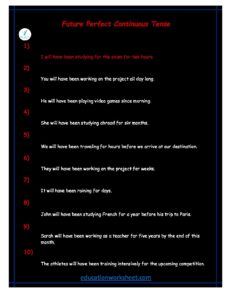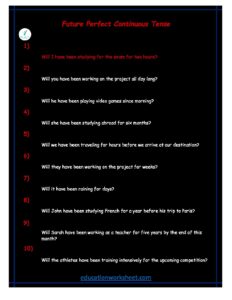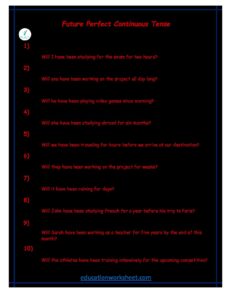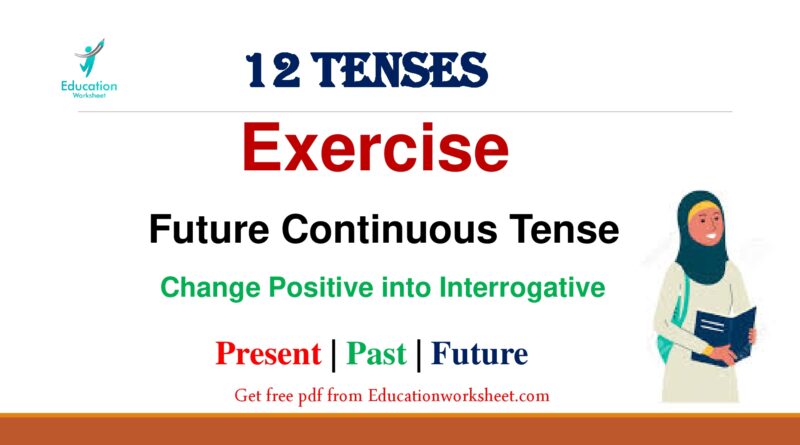how to converting Future Continuous Tense positive sentences to interrogative form
how to converting Future Continuous Tense positive sentences to interrogative form
The English language is a versatile tool for communication, offering various tenses to express actions and events in different ways. One of these tenses is the Future Continuous tense, which is used to discuss actions that will be ongoing at a specific point in the future. In this guide, we will delve into the intricacies of transforming positive Future Continuous tense sentences into interrogative ones. Understanding how to do this is essential for effective communication and conversation. We will explore the rules and various forms of questioning in the Future Continuous tense, providing you with a comprehensive understanding of how to structure interrogative sentences in this tense.
I. Review of Future Continuous Tense

Before we delve into transforming Future Continuous tense sentences, let’s refresh our understanding of this tense. The Future Continuous tense is used to discuss actions that will be ongoing at a particular point in the future. It is formed by combining the future auxiliary verb “will” with the base form of the verb, “be,” and the present participle of the main verb. For example, “I will be studying tomorrow evening.”
II. The Basics of Forming Interrogative Sentences

To convert a positive Future Continuous tense sentence into an interrogative one, we need to change the sentence structure. Interrogative sentences are used to ask questions, and there are several ways to structure them. In English, there are two primary methods: yes/no questions and wh-questions.
- Yes/No Questions
- In yes/no questions, you typically start with an auxiliary verb or a modal verb, followed by the subject and the base form of the main verb. For Future Continuous tense, we will use the auxiliary verb “will” in most cases.
Example:
- Positive: They will be working.
- Interrogative (Yes/No): Will they be working?
- Wh-Questions
- Wh-questions begin with a question word (e.g., who, what, when, where, why, how) followed by the auxiliary verb, the subject, and the base form of the main verb.
Example:
- Positive: She will be cooking dinner.
- Interrogative (Wh): What will she be cooking for dinner?
III. Basic Rules for Converting to Interrogative Form
To transform a positive Future Continuous tense sentence into an interrogative one, follow these fundamental rules:
- Start with the appropriate question word for wh-questions (if applicable) or the auxiliary verb for yes/no questions.
- Follow with the subject.
- Then, include the auxiliary verb “will.”
- Finish with the base form of the main verb.
IV. Interrogative Forms for Yes/No Questions
Now, let’s delve deeper into the formation of yes/no questions in the Future Continuous tense.
- Use of “Will” as the Auxiliary Verb
- As mentioned earlier, in yes/no questions, you start with the auxiliary verb “will.”
Example:
- Positive: I will be studying.
- Interrogative (Yes/No): Will I be studying?
- Subject-Verb Agreement
- Ensure that the subject-verb agreement is maintained. This means that the form of “will” used in the question should match the subject of the sentence.
Example:
- Positive: They will be playing.
- Interrogative (Yes/No): Will they be playing?
- Inversion of Subject and Auxiliary Verb
- In yes/no questions, the subject and auxiliary verb are inverted, meaning they switch places.
Example:
- Positive: She will be sleeping.
- Interrogative (Yes/No): Will she be sleeping?
V. Interrogative Forms for Wh-Questions
Now, let’s explore how to form wh-questions in the Future Continuous tense.
- Start with the Question Word
- Begin your wh-question with the appropriate question word (e.g., who, what, when, where, why, how).
Example:
- Positive: We will be traveling.
- Interrogative (Wh): When will we be traveling?
- Maintain Subject-Verb Agreement
- Just like in yes/no questions, ensure that the subject-verb agreement is maintained in wh-questions.
Example:
- Positive: He will be meeting his friends.
- Interrogative (Wh): Who will he be meeting?
- Inversion of Subject and Auxiliary Verb
- In wh-questions, the subject and auxiliary verb are inverted, as in yes/no questions.
Example:
- Positive: They will be playing games.
- Interrogative (Wh): What games will they be playing?
VI. Special Cases and Additional Considerations
In the English language, there are always exceptions and unique cases to consider when forming questions. Here are a few special cases and additional considerations when converting positive Future Continuous tense sentences to interrogative form:
- Negative Questions
- Negative questions are formed by combining the auxiliary verb “will” with “not” to create the contraction “won’t.” The rest of the structure follows the rules for yes/no or wh-questions.
Example:
- Positive: I will not be working.
- Negative Question: Won’t I be working?
- Tag Questions
- Tag questions are short questions added at the end of a statement to seek confirmation. In the Future Continuous tense, you typically use “will” and “won’t” to form tag questions.
Example:
- Positive: She will be coming, won’t she?
- Polite Requests
- You can use the Future Continuous tense to make polite requests. In this case, the interrogative form might start with phrases like “Could you” or “Would you” followed by the base form of the main verb.
Example:
- Positive: They will be helping, please.
- Interrogative (Polite Request): Would you be helping, please?
VII. Practice Exercises
To reinforce your understanding of converting Future Continuous tense sentences into interrogative form, let’s work through some practice exercises. Try converting the following positive sentences into interrogative questions:
- She will be studying.
- They will be cooking dinner.
- I will not be working.
- We will be visiting the museum.
- He will be playing football tomorrow evening.
how to converting Future Continuous Tense positive sentences to interrogative form


